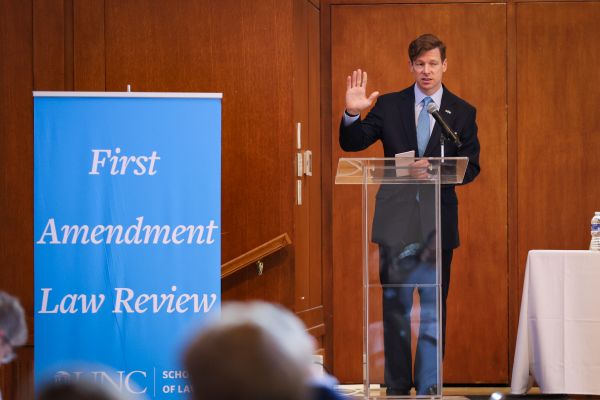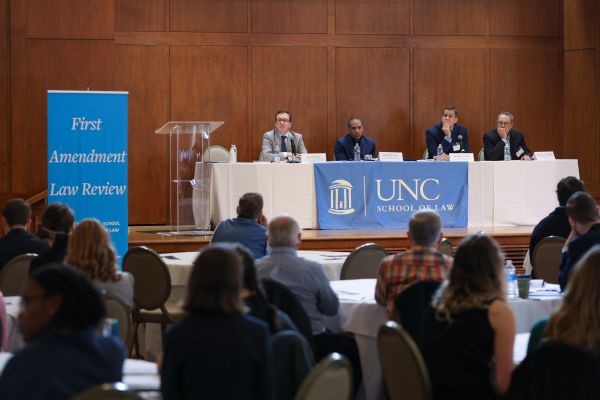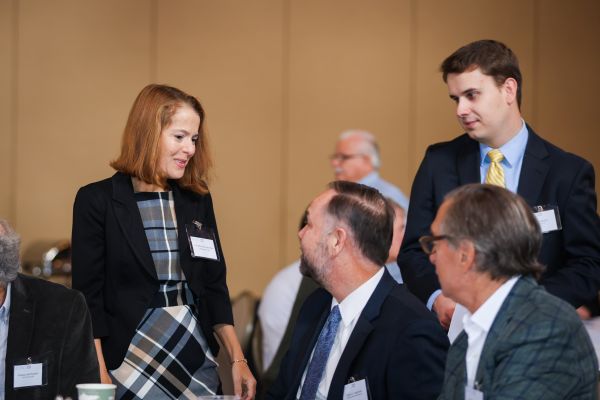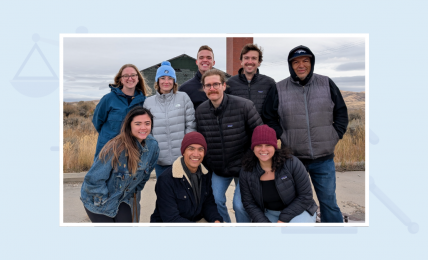As America’s universities grapple with intensifying free speech debates, UNC School of Law convened a timely and crucial symposium to tackle these high-stakes challenges head-on. Bringing together a diverse array of constitutional scholars, university presidents and provosts, and leading legal experts, this year’s First Amendment Law Review symposium provided a vital platform to examine how institutions can safeguard open discourse while upholding their academic mission.

UNC-Chapel Hill Chancellor Lee Roberts opened the event, telling the packed room at the Carolina Club that public universities have a unique role in “tackling challenging topics” — but only if students and faculty can freely exercise their curiosity. This sentiment echoed through the keynote from Mary-Rose Papandrea, the Samuel Ashe Distinguished Professor of Constitutional Law at Carolina Law, who cited the inconsistency in court decisions as evidence that legal protections for academic freedom remain “much less clear than one might expect.”
The symposium then turned to the complexities of student protests, with the first panel moderated by Michael J. Gerhardt, Burton Craige Distinguished Professor of Jurisprudence. In the next panel, George Washington University Provost and Professor of Law Christopher Bracey recounted a firsthand account of demonstrations on his campus rapidly spiraling, explaining how a small group of 15 student protesters quickly mushroomed into a 350-person event, complete with megaphones and drones, that overwhelmed the campus police force. Bracey’s gripping testimony vividly illustrated the delicate balance administrators must strike in responding to disruptive activism while upholding free speech principles.
Bracey described the difficult decisions he and his team faced as the situation escalated. Initially, the small group of students had gathered peacefully to exercise their rights. But as word spread and more protestors arrived, the campus was suddenly overrun. Bracey and the administration had to quickly determine how to maintain order and safety without infringing on the students’ ability to freely express themselves.
This challenge lay at the heart of the panel’s discussions. Speakers explored how universities can create clear, consistent policies for managing demonstrations that don’t unduly restrict protected speech. They also grappled with the role of campus police, debating when force may be necessary versus exacerbating tensions. Several participants emphasized the importance of open communication and de-escalation tactics to defuse conflicts before they spiral out of control.

Overall, the panelists stressed that navigating student protests requires careful, nuanced leadership. As Bracey observed, administrators today face an unprecedented balancing act — safeguarding academic freedom and public safety simultaneously. The Carolina Law symposium provided a vital forum for exploring potential solutions to these complex, high-stakes challenges.
Speakers later delved into the mounting tensions around faculty speech rights, with William P. Marshall, the William Rand Kenan Jr. Distinguished Professor of Law, steering the discussion. University of Texas scholar David M. Rabban, the Dahr Jamail, Randall Hage Jamail, and Robert Lee Jamail Regents Chair, provided a nuanced analysis of the “promise and peril” in universities’ adoption of institutional neutrality policies. Rabban explored how these neutral-sounding approaches could actually undermine the robust exchange of ideas that is essential to academic enterprise.
The panel examined how institutional neutrality policies, while intended to avoid taking sides on contentious issues, may inadvertently constrain free expression on campuses. Rabban argued that by trying to remain neutral, universities risk neglecting their duty to foster the unfettered pursuit of knowledge. Panelists debated whether these policies represented a valid attempt at impartiality or an abdication of educational leadership.
Throughout the day, UNC System President Peter Hans stressed the crucial importance of defending open inquiry on campuses, asserting that as public institutions, they “belong to everybody” and must balance diverse perspectives, even as they navigate intense political and legal pressures. Hans cautioned against universities taking overt political stances, arguing this could inadvertently constrain the very free expression they aim to protect.
Reflecting on the event, Jack Denton, third-year law student and symposium editor of the First Amendment Law Review, praised it as the “best yet” for the publication. Denton expressed deep gratitude to Professors David Ardia and Mary-Rose Papandrea for assembling an outstanding lineup of panelists who brought rich, varied insights to the discussions. “This symposium was a crucial platform for charting a path forward on these complex free speech challenges,” Denton observed.

The symposium provided a vital forum for navigating these high-stakes First Amendment quandaries. As Professor Papandrea concluded, safeguarding the “quintessential marketplace of ideas” on university campuses requires principled, collaborative leadership. In an era of growing threats to free expression, the event offered a roadmap for higher education administrators to fulfill their essential role as bastions of critical inquiry and democratic discourse.
Experts noted that this work has never been more important, with nimble, solutions-oriented leaders needed to deftly manage the competing demands to protect both free expression and academic excellence. The symposium covered a wide range of critical topics, from the spread of campus protests to concerns over “cancel culture” and legislative efforts targeting universities. Presenters explored potential avenues for universities to navigate these complex challenges while staying true to their core mission of knowledge creation and dissemination.
Ultimately, the symposium highlighted the vital importance of defending free speech on America’s campuses. By convening this crucial conversation, the First Amendment Law Review provided a platform to chart a path forward — one defined by principled leadership, institutional adaptability, and an unwavering commitment to safeguarding the “quintessential marketplace of ideas.” In an era of growing threats, the event offered a roadmap for universities to fulfill their essential role as bastions of critical inquiry and democratic discourse.



